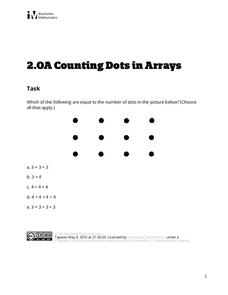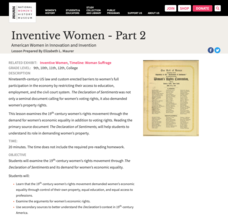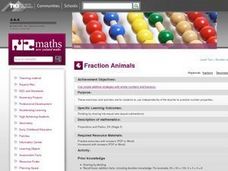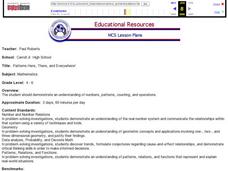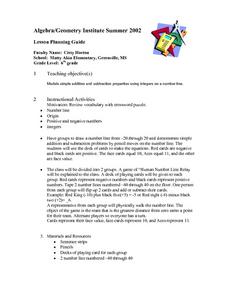Willow Tree
Solving Inequalities
What does solving an inequality have in common with solving an equation? Almost everything! A math resource focuses on the one exception. The examples lead learners through the steps of solving an equality when multiplying or...
Illustrative Mathematics
Counting Dots in Arrays
Mathematical arrays can represent several different math skills, including counting groups, multiplication, and even area. In this specific task, learners are asked to identify the addition equations that are equal to a 3 x 4 array....
Houghton Mifflin Harcourt
Unit 8 Math Vocabulary Cards (Grade 6)
Additive inverse, expression, and irrational numbers are a few terms you'll find when you use a set of 22 flashcards designed to reinforce math vocabulary. The set includes two types of cards; a bold-faced word card, and a corresponding...
Teach Engineering
Bone Density Math and Logarithm Introduction
What do logarithms have to do with bone density? Scholars learn that the equation for bone density includes logarithms. The majority of the third lesson plan of seven is devoted to logarithms and their properties.
Curated OER
Properties of Angles, Lines, and Triangles
In this properties of angles, lines and triangles worksheet, 10th graders solve and complete 28 different problems that include determining the measurement of various figures shown. First, they use the geometric properties and theorems...
Curated OER
Properties of Quadrilaterals
In this properties of quadrilaterals worksheet, students use the properties of quadrilaterals to find the perimeter, angle measurement or length of a missing side of a given polygon. Examples and explanations of the properties are...
Curated OER
Addition Exercises
In this adding worksheet, learners add two digits and fill in the blank that makes the equations balance. Students solve seven problems.
Curated OER
Solving Equations
In this solving equations worksheet, students solve and complete 12 different problems that include solving various equations by addition or subtraction. First, they identify and define the difference between using the addition property...
Curated OER
Identity and Equality Properties
In this math worksheet, students solve five problems, identifying each property as it is used. They identify the used property in 9 problems.
Curated OER
Additive Inverses
Students investigate properties of additive inverses. In this properties of additive inverses activity, students discuss the what it means for two numbers to be opposites. Students discuss representing opposite numbers using...
National Woman's History Museum
Inventive Women - Part 2
The Declaration of Independence was published in 1776. The Declaration of Sentiments and Resolutions, modeled after the Declaration of Independence, was drafted and read by Elizabeth Cady Stanton at the Seneca Falls Convention in 1848....
Flipped Math
Unit 1 Review: Analyze Graphs and Expressions
Get in one last practice. Pupils work through 12 problems and a performance task to review the topics in Unit 1. The problems cover analyzing and modeling with graphs, algebraic properties of equality, and adding, subtracting, and...
Curated OER
Fraction Animals
Second, third, and fourth graders explore fraction strategies and division by splitting sets of farm animals into equal numbers. Independently, they read word problems, solve them, and check their answers.
For the Teachers
$1 Math
Captivate your class by having them find the value of their names, different zoo animals, musical instruments, etc.,with a mental math lesson. Using the coding formula listed, children learn to fluently estimate and calculate...
Curated OER
Using Proof in Algebra
In this using proofs in algebra worksheet, 10th graders solve 2 proofs by applying the many rules from algebra for the Properties of Equality for real numbers. They name the property that justifies each statement as seen in the...
Curated OER
Multiplication & Division
Helpful for building a multiplication unit that focuses on different strategies. With explanations about repeated addition and subtraction as foundations for multiplication, scaling, summaries of progression, and basic multiplication and...
Curated OER
Solving Equations
In this solving equations worksheet, students solve and complete 15 different problems. First, they isolate the variable on one side of the equation using the addition/subtraction property of equality. Then, students check each solution...
Curated OER
Addition/Subtraction Strategies
Third graders recall all their addition and subtraction facts to 20. They use the relevant number strategy with whole numbers. Students are taught place value in relation to decimals, and identify 'which decimal is larger.' They...
Curated OER
Domain: Operations and Algebraic Thinking
Practice basic operations for young mathematicians in fun ways! Using two decks of cards (Ace through 10 plus the joker), learners play "memory" by matching numbers that can be added to make 10 and writing number sentences. In another...
Curated OER
Patterns Here, There and Everywhere
Pattern recognition is a skill often used in mathematics. Learners count and sort manipulatives, organize the data into a graph and answer questions about the information displayed. They collect the objects to be used and create patterns...
Curated OER
Using Properties Multiple Choice
In this geometry activity, students identify the different properties to represent a given statement. They use proof to show how they arrived at their answer. There are 5 questions with an answer key.
Curated OER
Addition & Subtraction Properties With Integers
Sixth graders use a number line to solve addition and subtraction problems. In groups, they play a game of "Human Number Line Relay." They use a deck of cards to randomly create addition and subtraction equations and physically walk a...
Curated OER
Solving Inequalities By Using Addition And Subtraction
Seventh graders solve inequalities using addition and subtraction. They write number sentences based on word problems.
EngageNY
End-of-Module Assessment Task: Grade 7 Module 2
Learners demonstrate their ability to operate with rational numbers through a five-question assessment that includes questions ranging from simple operations with integers to solving two-step equations with rational coefficients.

